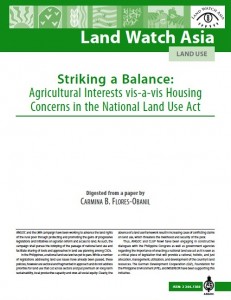Focal point
Location
Founded in 1979, ANGOC is a regional association of 20 national and regional networks of non-government organizations (NGO) in Asia actively engaged in food security, agrarian reform, sustainable agriculture, participatory governance and rural development. ANGOC member networks and partners work in 14 Asian countries with an effective reach of some 3,000 NGOs and community-based organizations (CBOs). ANGOC actively engages in joint field programs and policy debates with national governments, intergovernmental organizations (IGOs), and international financial institutions (IFIs).
Mission & Vision:
The organisation's mission is to create a policy and social environment that enables Asian Rural Poor Communities to exercise their rights to participatory development, gain access to and control of their natural resources, and engage in sustainable livelihoods while drawing from Asia’s rich spiritual and cultural traditions. ANGOC envisions vibrant Asian rural communities living in harmony with nature as stewards of the Earth, whose members are able to realize their full human potentials, collectively chart their path to development, provide for their present and future needs, and equitably share the fruits of their labors in community celebrations of life.
Resources
Displaying 21 - 25 of 102Women’s Land Rights in Asia
In Asia, land issues affect women in ways that call for serious deliberation and action. Suffice it to say, the legitimate concerns of females transcend generations and geographical borders. Attaining a stable livelihood, meeting basic resource needs and having adequate housing are just some of the issues that affect women. There is, however, a pressing need to heed the woes of rural women in particular. The poor are swelling in numbers and the condition of poor rural women lies on the fringes of the global economic agenda.
Striking a balance: Agricultural interests vis-à-vis housing concerns in the National Land Use Act
This publication is a lobby material to advocate the passage of the National Land Use Act. It examines the seemingly conflicted need for food and housing in the country. The writer – Carmina Flores-Obanil – describes that from 1982 to 1997 massive land conversions in the urban fringes of Bulacan and Cavite attribute to policies encouraging the expansion of industries in rural areas.
Striking a balance: Agricultural interests vis-à-vis housing concerns in the National Land Use Act
This publication is a lobby material to advocate the passage of the National Land Use Act. It examines the seemingly conflicted need for food and housing in the country. The writer – Carmina Flores-Obanil – describes that from 1982 to 1997 massive land conversions in the urban fringes of Bulacan and Cavite attribute to policies encouraging the expansion of industries in rural areas.
Striking a balance: Agricultural interests vis-à-vis housing concerns in the National Land Use Act
This publication is a lobby material to advocate the passage of the National Land Use Act. It examines the seemingly conflicted need for food and housing in the country. The writer – Carmina Flores-Obanil – describes that from 1982 to 1997 massive land conversions in the urban fringes of Bulacan and Cavite attribute to policies encouraging the expansion of industries in rural areas.
Striking a balance: Agricultural interests vis-à-vis housing concerns in the National Land Use Act
This publication is a lobby material to advocate the passage of the National Land Use Act. It examines the seemingly conflicted need for food and housing in the country. The writer – Carmina Flores-Obanil – describes that from 1982 to 1997 massive land conversions in the urban fringes of Bulacan and Cavite attribute to policies encouraging the expansion of industries in rural areas.



